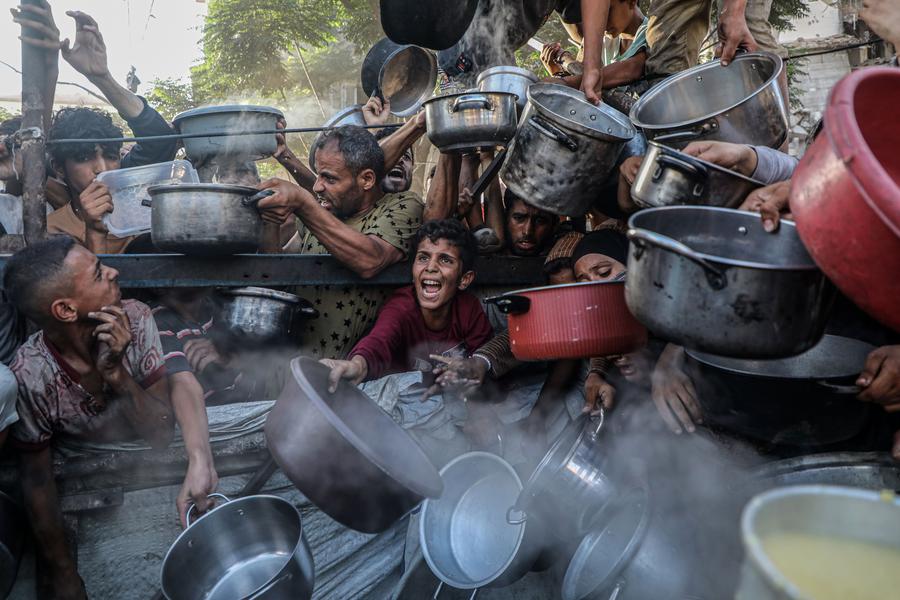
The United Nations Office for the Coordination of Humanitarian Affairs (OCHA) warned on July 20 that Israel’s mass displacement order “has dealt yet another devastating blow to the already fragile lifelines keeping people alive across the Gaza Strip”.
In a statement, OCHA said that the order covers some 5.6 square kilometers of Deir al Balah, spanning four neighborhoods. It added that initial estimates indicate that up to 80,000 people were in the area at the time the order was issued, including some 30,000 people sheltering in 57 displacement sites.
“UN staff are remaining in Deir al Balah, spread across dozens of premises. Their coordinates have been shared with the relevant parties. These locations — as with all civilian sites — must be protected, regardless of displacement orders,” the OCHA update added.
In an X post on July 20, Israeli military spokesman Avichay Adraee issued an evacuation order, cautioning everyone who intended to return or has returned to the areas of Beit Lahia, Jabalia, Beit Hanoun, Shuja'iyya, Daraj, Old City, Tuffah, Zaytoun, and their neighborhoods that these were dangerous combat zones as the Israel Defense Forces were operating in them with extreme intensity.
OCHA cited that some of the affected areas had several humanitarian warehouses, health clinics, and critical water infrastructure.
“Any damage to this infrastructure will have life-threatening consequences. With this latest order, the area of Gaza under displacement orders or within Israeli-militarized zones has risen to 87.8 percent, leaving 2.1 million civilians squeezed into a fragmented 12 percent of the Strip, where essential services have collapsed,” said OCHA.
It added that the new order “will limit the ability of the UN and our partners to move safely and effectively within Gaza, choking humanitarian access when it is needed most”.
In a statement on July 20, the UN World Food Programme (WFP) also renewed its call for the protection of all civilians and aid workers delivering life-saving assistance.
ALSO READ: Dozens of Palestinians killed in Israeli attacks on aid center in Gaza
It released a statement after civilians anxiously waiting for food supplies came under fire from Israeli tanks, snipers, and other gunfire.
Western and Middle East media reports said at least 93 people were killed while queuing for food on July 20 at the Zikim crossing.
“We are deeply concerned and saddened by this tragic incident resulting in the loss of countless lives. Many more suffered life-threatening injuries,” said the WFP.
“These people were simply trying to access food to feed themselves and their families on the brink of starvation. This terrible incident underscores the increasingly dangerous conditions under which humanitarian operations are forced to be conducted in Gaza,” the statement said.
The WFP lamented that the latest violent incident came despite assurances from Israeli authorities that humanitarian operational conditions would improve.
“There should never, ever, be armed groups near or on our aid convoys, as reiterated on many occasions to all parties to the conflict. Shootings near humanitarian missions, convoys, and food distributions must stop immediately. Any violence involving civilians seeking humanitarian aid is completely unacceptable,” said the WFP.
READ MORE: UN chief says Gaza truce ‘not enough’
It said Gaza’s hunger crisis has reached new levels of desperation, and malnutrition was surging with 90,000 women and children in urgent need of treatment.
“The World Food Programme continues to call for the protection of all civilians and aid workers delivering life-saving assistance. WFP teams accompanying convoys should not have to risk their own lives in the effort to save others,” it said, as it called for a “long overdue” ceasefire.
Meanwhile, Israeli Foreign Minister Gideon Saar said in an X post on July 20 that the visa of Jonathan Whittall, OCHA’s head of office in the West Bank and Gaza, would not be extended, over accusations that the senior UN official was biased against Israel.
Ahmad Ghouri, an associate professor at the School of Law, Politics, and Sociology at the University of Sussex in the UK, told China Daily that Israel is legally entitled as a sovereign state to grant or deny visas to foreign nationals, including UN officials, under domestic law, but this is not absolute when it comes to the occupied territories.
READ MORE: Israel expresses 'regrets' over deadly strike on Gaza church
He said Israel is expected to cooperate with UN agencies under international agreements, and denying visas to humanitarian workers in an occupied territory “raises serious legal and ethical questions”.
Ghouri, also a senior counsel at Albertson Solicitors in London, noted that the humanitarian situation in Gaza is dire and that speaking about it “should not automatically be considered biased”.
He said the decision could set dangerous precedents, including weakening the independence of UN operations.
“In the long run, it may also lead to legal challenges and scrutiny of Israel’s obligations as an occupying power,” said Ghouri, adding that International humanitarian law obliges the occupying power to facilitate aid and protect civilians
“Many legal experts believe denying entry to key humanitarian officials undermines these responsibilities. So while the action might be lawful domestically, its legality under international law is questionable, and the wider consequences deserve careful reflection,” said Ghouri.


